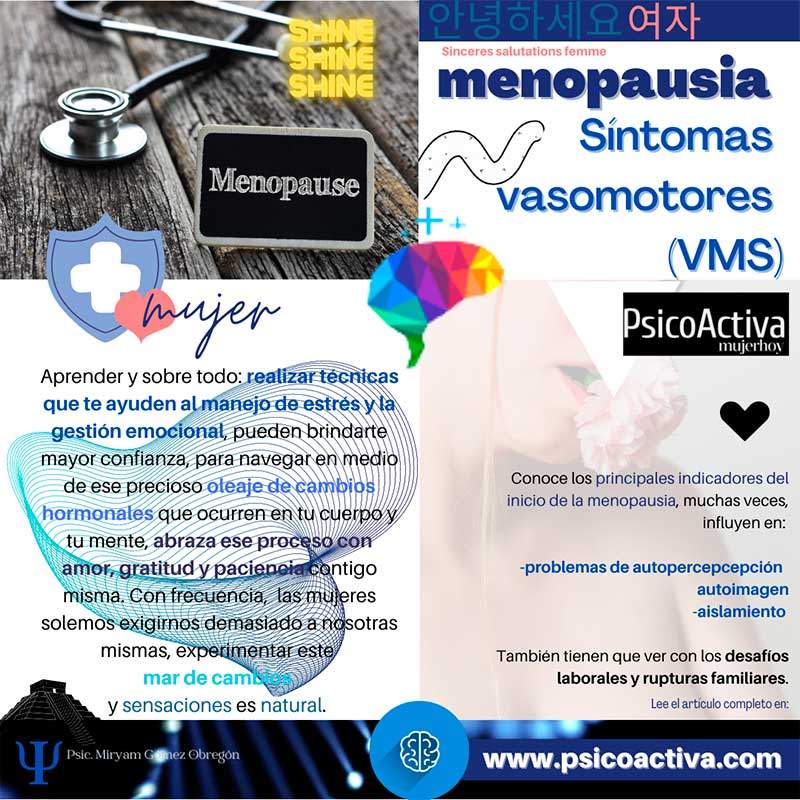Menopause, some changes that you should know

- 4553
- 1480
- Hugh Greenholt
Menopause is defined as the permanent cessation for more than twelve months of menstruation, secondary to the loss of hormonal activity in the ovary. His arrival, has biopsychosocial impact, because it generally occurs Between 45 and 55 years old. During this time, The woman is usually more productive, So, sometimes, it means a battle to maintain functionality and quality of life. While many also fight with challenging vital processes and changes in their mood; represents a golden stage, in which also It is possible to experience satisfaction, joy, relief and tranquility.
During menopause, a beautiful transformation occurs, which implies many changes, it is important to know them, thus women at this stage and the previous one can prepare and opt for practices that favor their longevity, then I present some:
Content
Toggle- Vasomotor Symptoms (VMS)
- Hormonal metamorphosis and cognitive changes
- Changes in menopause and well -being
- Less pauses for the distress
- What other problems are common during menopause?
- Bibliographic references
Vasomotor Symptoms (VMS)
They are the main indicators of the beginning of menopause, many times, they influence self -perception problems, self -image and isolation. But they also have to do with work challenges and family breaks.
- About 75% of women are experienced "embarrassments" or "heat flachas".
- Night sweats.
- Hyperhidrosis, excessive sweating, which can cause physical and emotional discomfort.
- Urinary tract atrophy, favoring urinary incontinence and infections of the same.
- Increased cardiovascular risk.
- Decreased libido.
- Loss of skin elasticity.
Hormonal metamorphosis and cognitive changes
Hormonal changes affect at the level:
- Cerebral: Insomnia and sleep disorders is common.
- Social
- Psychological:
-
- Mood problems:
- Feelings like waves of sadness and depression.
- Mood problems:
The risk factors for suffering from depression in adulthood increase when previously presented and increased with the number of times they have experienced it. However, vulnerability to depressive episodes in the perimenopausic period increases with or without antecedent of affective disorders due to hormonal relationship with serotonin ... for that: "Do not harm him with the petal of a rose".
Many women, at this stage they experience Sensation of loss of pleasure, lack of interest or motivation, pessimism, anxiety, indecision and excess guilty, that sometimes leads them to make deep changes in their person.
- 70% of women suffer irritability, That can manifest as: anger with the feeling of being about to "exploit", feelings to the flower of skin, tension, hostile behavior, intolerance, frustration, symptoms such as: dysphoria, sadness and vulnerability are also common. A good instrument for the measurement of irritability is the Born-Steiner scale (irritability scale: observer rating).
- Alterations in the self-esteem. What are some of the most common changes that influence the loss of confidence during menopause? The deterioration of health due to age and self -perception, difficulties with the couple and job challenges, many women see their possibilities of obtaining paid employment and with benefits, these are challenges that they usually face. Working with a psychologist about negative beliefs and programming, which we often impose as a label ourselves and that can become our own mental executioner. Learning about yourself and unlearning thought patterns that affect us is crucial for emotional health at this stage.
- Cognitive deterioration.
- Seattle Midlife Women's Heath Study (NAMS, 2004) reported that 62% of women have changes in your memory. Those who receive hormonal replacement therapy have better scores on memory scales.
- Mental fog
Therefore, the cognitive training is essential At this stage for maintenance of our beautiful brain and its processes.
 Self -esteem, what is and how to improve it in 8 steps
Self -esteem, what is and how to improve it in 8 steps Changes in menopause and well -being
The Thermoregulation, blood pressure, appetite and voracity during the menopause, They relate to the Corticotropin release and decreased norepinenaline recapture, since in parallel the sensitivity of dopamine receptors is reduced. Estrogens normally induce renewal, growth of dendrites and synapses in hippocampus neurons, which regulate neurotropic and neuropeptide factors (PROTY et al, 2005).

There is also usually a decrease in libido. However, sometimes, testosterone levels can increase: aggressiveness, sexual appetite and desire.
How Menopause affects female sexuality
Learning and above all: performing techniques that help you stress management and emotional management, can give you greater confidence, to navigate in the middle of that beautiful wave of hormonal changes that occur in your body and your mind, embrace that process with love, gratitude and patience with yourself, many women tend to demand too much to ourselves, experiencing this sea of changes and sensations is natural.
During the Premenopause, they generate 300 micrograms of testosterone a day On average, from the adrenal gland and the ovary. Testosterone levels decrease up to 50% in menopause and in women with ooferectomy, a surgical procedure to remove an ovary or both.
Some Somatic changes that can be experienced during menopause are: lack of energy, increase in pain, headaches (headaches), decrease or increase in appetite, associated with the increase in weight and cardiovascular or gastrointestinal conditions.
By practicing emotional management, a beautiful metamorphosis in women can occur at this stage. Well, it is Full of experience, wisdom that gave him life and his vital experiences, as well as many acquired skills with which he can now benefit his family, his neighbor and herself.
Less pauses for the distress
It is always important to take care of stress levels, however, during this stage it is fundamental, if you want to obtain psycho -emotional well -being. The Progesterone affects the mood, increasing: dysphoria and irritability, same that together with: ".. The distress sustained for long periods of time, a higher risk of depression in menopause has been related".
Likewise, it is common, that during this stage of life, the social stress, Because it is common for the demands to: work or their lack, by some family members, since they may require specialized care, of the social groups to which it is affiliated and due to Vital events, Like the disease of a relative, the death of loved ones and the departure of the children of the house ... The anthropologically and historically are caregivers!
“You are fire of love, sunlight, volcano and earth, where you pass: you leave footprint! Woman: You were born to love ". Camilo Sesto
As a mechanism of Social compensation, During this beautiful stadium called menopause, women tend to get more involved with the care of children, grandchildren, husband, relatives and people who require special attention for various reasons, thus increasing their level of their level of social stress.
Difference between stress, eustrés and distress
However, many times due to these changes and challenges, they do not feel valued in their efforts. What they contribute is very important for society, since they are a support of new generations and sometimes of older people, becoming an important bridge of knowledge and wisdom. If you have the privilege of having such a woman by your side, try to thank and value her small great details, although Personal assessment depends a lot on self -perception.
When they have Emotional discomfort Due to the changes of this stage and fail to feel good about themselves for a long time despite your sincere efforts, and above all, if the changes in menopause are influencing the deterioration of their health, work or emotional area, work In with a team of health professionals, which includes a therapeutic process with a psychologist, or with a psychologist, because it can help relieve that discomfort. With constancy and attachment to a psychological treatment, it can be integrated adaptively and embrace these changes of nature. Art Therapy and smart leisure activities can favor the process.
What other problems are common during menopause?
Longitudinal studies have related sleep disorders with menopause, which contribute to irritability, fatigue, memory disorders, feeling of shame in public, anxiety and depression.
Leventhal and collaborators (2007), observed an increase of women with fibromyalgia, pain in: chest, chronic articular, in legs, during menopause, especially when there was personal or family history and in turn an important decrease in sexual desire. Which can make them flourish other areas in which your attention and energy can now overturn; You can take advantage to enrich your life through art, culture, intelligent movement or science.
The decrease in the mortality index has made more attention on issues related to longevity and conditions associated with age. Menopause can be damn so that women opt for practices that favor their longevity and well -being, by embrapping the changes of nature adaptively with intelligence and love, because they are usually more aware of their health problems.
Above all, when they go hand in hand with trained health professionals, because thanks to the advances of science and technology: today, there are many options to improve style and quality life, which is hopeful.

Bibliographic references
- TIERNEY, JR., Lawrence m., McPhee, Stephen J. and Papadakis (2005). Clinical diagnosis and treatment. Mexico: Modern Manual.
- Deecher DC: Physiology of Themoregulatory Dysfunction and Current Approaches to the Treatment of Vasomotor Symptoms. EXPERT OPEN Drugs 2005,14: 434-448.
- Av Ne, Crawford SL, McKinlay SM: Psychosocial, Behavioral, and Elath Factors Related To Menopause Symptomatology. WOMENS HEALTH 1997, 3: 103-120.
- « Pollyanna syndrome, or the danger of being too happy
- How to handle loneliness after a divorce 11 suggestions »

